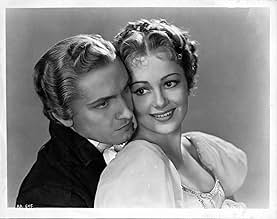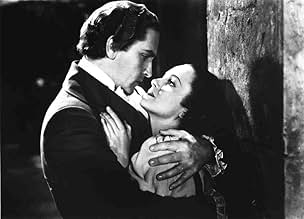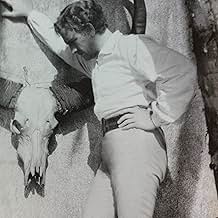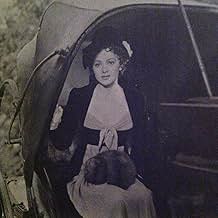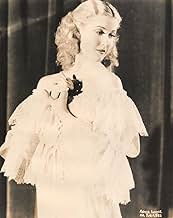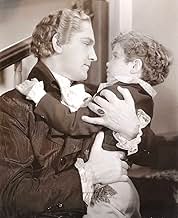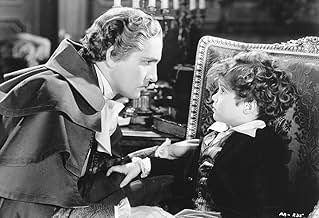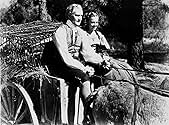VALUTAZIONE IMDb
6,3/10
2141
LA TUA VALUTAZIONE
Aggiungi una trama nella tua linguaIn 18th-century Italy, an orphan's debt to the man who raised him threatens to separate him forever from the woman he loves.In 18th-century Italy, an orphan's debt to the man who raised him threatens to separate him forever from the woman he loves.In 18th-century Italy, an orphan's debt to the man who raised him threatens to separate him forever from the woman he loves.
- Regia
- Sceneggiatura
- Star
- Vincitore di 4 Oscar
- 8 vittorie e 3 candidature totali
Recensioni in evidenza
I rented a tape of Anthony Adverse mainly to see what kind of performance the Academy was looking for in the first-awarded "best supporting actress" category. Gale Sondergaard's time on camera was actually quite brief and her villainous role required a strictly one-dimensional reading. There were no subtleties whatsoever, nor was there any need in the film for them. Ordinarily, it might seem surprising that her part would receive any attention at all, not to mention a prestigious award, but keeping in mind that Oscars in those days were to a large extent self-congratulatory spectacles passed around from studio to studio year by year, it really isn't surprising.
The film was long and episodic, as was the novel, and not particularly good at that. There was the glitz we've come to expect of course with the duels and chases thrown in for good measure. I kept wondering if the novel was written with Hollywood in mind. It's hardly readable nowadays. As far as directorial touches are concerned, it's no wonder that Mervyn LeRoy has long disappeared from anyone's pantheon. The kiddie-car version of France must have excited the Depression audiences. The film is very long and very expensive so perhaps there's something to say about that.
The film was long and episodic, as was the novel, and not particularly good at that. There was the glitz we've come to expect of course with the duels and chases thrown in for good measure. I kept wondering if the novel was written with Hollywood in mind. It's hardly readable nowadays. As far as directorial touches are concerned, it's no wonder that Mervyn LeRoy has long disappeared from anyone's pantheon. The kiddie-car version of France must have excited the Depression audiences. The film is very long and very expensive so perhaps there's something to say about that.
Fredric March, usually such a fine actor, was unable to give more than a wooden performance in the title role of 'Anthony Adverse'. Warner Bros. would have been better off using their up-and-coming new star, Errol Flynn, for this one--giving us the chance to see him paired once again with Olivia de Havilland. There are no sparks between March and de Havilland--he seems too old for the role despite clever make-up attempts to make him look suitable. But aside from the fact that he is miscast, there is a lot to admire about the film itself. For one thing, Claude Rains and Gale Sondergaard make the most memorable pair of villains ever seen in a 1930s movie. The sequence where they cause a coach and driver to go off a cliff is given an extra punch by their dialog. "He was my favorite coachman," says Rains dryly. "The coach was rather handy too," quips Sondergaard. Giving other outstanding performances are Edmund Gwenn, Louis Hayward, Anita Louise, Donald Woods and Akim Tamiroff. Some of the acting styles seem dated, as are the titles that connect the time span. The best-seller was a bulky 1,200 pages from which the scriptwriter trimmed the story down considerably, excluding whole segments of the book and still ending up with a film well over two hours. Strange how the celebrated novel is barely remembered today. The opera scenes with Olivia de Havilland are interesting. She was a radiant young beauty at the time but could have used a better technique in her lip sync to the lyrics. Interesting historical drama of the Napoleonic era with Rains and Sondergaard giving the best performances. I've written articles on both of them for CLASSIC IMAGES, inspired by their performances in this film.
Frederic March is "Anthony Adverse" in this 1936 film that also stars Olivia de Havilland, Claude Rains, Anita Louise Gail Sondergaard, Donald Woods, Edmund Gwenn and Louis Hayward.
Anita Louise and Hayward both have small roles as illicit lovers in the beginning of the film - she's married to Marquis de Luis (Claude Rains) and dies giving birth to a son by Denis (Hayward). The evil marquis drops the baby off at a convent, where he lives until he is 10 years old. Then he is adopted by a merchant, Mr. Bonnyfeather (Gwenn), who happens to be his grandfather.
Bonnyfeather sees his daughter in the boy's (Billy Mauch) angelic face. This beautiful little boy grows up to be a blond Frederic March, who has been given the name Anthony Adverse. He's in love with Angela (de Havilland), an aspiring opera singer, but goes to Africa to recover his grandfather's fortune rather than stay with her. There he becomes involved in slave trading. When he returns, things have changed for Angela - and for him.
The film is based on a best-selling book, and I have to agree that both the film and the book seem forgotten today, as is the director, Mervyn Leroy. March is wrong for the role - he doesn't convey enough charisma, for one thing - certainly Brian Aherne or Errol Flynn would have been much more compelling. March was a wonderful actor but he needed a strong director to get him away from being "stagy," and this type of role was never his métier anyway.
The gorgeous ingénue de Havilland gives a lovely performance, but the standouts are the villains - Sondergaard, as Bonnyfeather's housekeeper and Claude Rains as the marquis.
TCM gives this movie very high stars, probably based on the fact that it won four Oscars (one for Sondergaard who doesn't do much but look snide) and that it was nominated for Best Picture in 1936. The pickings must have been slim.
This is a good film, with an exciting carriage chase in the mountains and some brutal scenes of slave trading, but it's hard to keep interested in it. Adverse isn't terribly likable, for one thing. It's the story of a man and how he is molded into a human being by two priests and a woman. It's a lofty idea that doesn't quite make it onto the screen.
Anita Louise and Hayward both have small roles as illicit lovers in the beginning of the film - she's married to Marquis de Luis (Claude Rains) and dies giving birth to a son by Denis (Hayward). The evil marquis drops the baby off at a convent, where he lives until he is 10 years old. Then he is adopted by a merchant, Mr. Bonnyfeather (Gwenn), who happens to be his grandfather.
Bonnyfeather sees his daughter in the boy's (Billy Mauch) angelic face. This beautiful little boy grows up to be a blond Frederic March, who has been given the name Anthony Adverse. He's in love with Angela (de Havilland), an aspiring opera singer, but goes to Africa to recover his grandfather's fortune rather than stay with her. There he becomes involved in slave trading. When he returns, things have changed for Angela - and for him.
The film is based on a best-selling book, and I have to agree that both the film and the book seem forgotten today, as is the director, Mervyn Leroy. March is wrong for the role - he doesn't convey enough charisma, for one thing - certainly Brian Aherne or Errol Flynn would have been much more compelling. March was a wonderful actor but he needed a strong director to get him away from being "stagy," and this type of role was never his métier anyway.
The gorgeous ingénue de Havilland gives a lovely performance, but the standouts are the villains - Sondergaard, as Bonnyfeather's housekeeper and Claude Rains as the marquis.
TCM gives this movie very high stars, probably based on the fact that it won four Oscars (one for Sondergaard who doesn't do much but look snide) and that it was nominated for Best Picture in 1936. The pickings must have been slim.
This is a good film, with an exciting carriage chase in the mountains and some brutal scenes of slave trading, but it's hard to keep interested in it. Adverse isn't terribly likable, for one thing. It's the story of a man and how he is molded into a human being by two priests and a woman. It's a lofty idea that doesn't quite make it onto the screen.
Wrongheaded critics:
There are more than one user reviews posted here including one that says the film should get zero stars because it deals with slavery. I think such an attitude about a movie that was made at any time let alone the 1930s is absurd. Are they supposed to pretend that slavery in the 1700s somehow did not exist and that many many people were involved in this trade? It's idiotic. The film clearly shows that there were those risking their lives in opposition to the slave trade and that there were others who were corrupted by the wealth and power that they gained from it. So to those pretentious and moralistic critics, I say get off your self righteous high horse and look at this film and all others in its proper historical context.
Fredric March stars as the title character, an orphan boy discarded due to his illegitimacy, who overcomes much adversity throughout his life. He is raised in a convent and adopted by a wealthy merchant, Edmund Gwenn, at the age of ten. He learns the business, but is shipped to Havana around the time of the French Revolution. Before he departs, it is learned that he has married the daughter of a servant, Olivia DeHavilland. He is thought lost at sea by all, but is actually in Africa running a slave trade, with his heart blackening the whole time. From there, the tale takes many twists as Anthony must find goodness in his heart again, and DeHavilland may be the key. The drama is a bit heavy-handed and some overacting is present. Claude Rains and Gale Sondergaard make great antagonists, and Sondergaard won a Best Supporting Actress Oscar for her performance.
Lo sapevi?
- QuizGale Sondergaard made her film debut in "Anthony Adverse" and won an Academy Award in the brand-new category of Best Supporting Actress.
- BlooperDuring the duel between Don Luis and Denis Moore, the sword wielded by Moore was "unbated", i.e. his fencing foil was blunted with a protective guard on the tip.
- Citazioni
[first title card]
Title Card: Those who are destined to live during times of war and social upheaval are victims of cruel fate ~~ unable to find comfort in the past or peace in the present. They are the spiritual orphans of the world.
- ConnessioniFeatured in The Making of a Great Motion Picture (1936)
- Colonne sonoreI'll Wait For You My Love (Angela's Song)
(uncredited)
Composer: Erich Wolfgang Korngold
Lyrics by Howard Koch (uncredited)
Sung by Carol Ellis (uncredited)
I più visti
Accedi per valutare e creare un elenco di titoli salvati per ottenere consigli personalizzati
- How long is Anthony Adverse?Powered by Alexa
Dettagli
- Data di uscita
- Paese di origine
- Lingue
- Celebre anche come
- Anthony Adverse
- Luoghi delle riprese
- Azienda produttrice
- Vedi altri crediti dell’azienda su IMDbPro
Botteghino
- Budget
- 1.050.500 USD (previsto)
- Tempo di esecuzione
- 2h 21min(141 min)
- Colore
- Mix di suoni
- Proporzioni
- 1.37 : 1
Contribuisci a questa pagina
Suggerisci una modifica o aggiungi i contenuti mancanti


